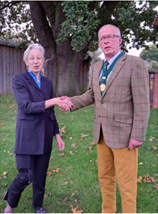Graham was installed as President of the Society at the recent AGM. A long-standing breeder of Southdown sheep, Graham admits that he was staggered to be invited to take on the role of President.
“It was early April 2022 when the Chairman first contacted me and I have to admit I thought it was an April Fool’s trick. I am extremely honoured and proud to be to have been offered the position for the year, I consider it a huge privilege.
I had wanted to be a farmer since I was a small child and I am proud to have achieved this lifelong ambition, I consider myself to be a very fortunate man.
Growing up in South London, my careers master sneered when I said I wanted to go to agricultural college, there were not many farms in London in the 1960s.
With the support of family and friends I graduated from agricultural college and have spent my whole life living my dream. My first 20 years were spent in the dairy industry, but my love of sheep prevailed.
In 1995 when I returned from working in New Zealand I purchased my first five Southdown ewes from Ron Piddock in West Sussex. I decided on Southdowns as I was inspired by the author Barclay Wills, hence the choice of ‘Barclay’ as my flock prefix.
I have been very fortunate over the past 30 years in that my employers have always allowed me to keep my flock when I have moved jobs. I am now a full time shepherd on the Chiltern hills, managing a flock of 450-500 ewes NZ Romneys. My boss thoroughly approves of the use of Southdown tups on some of the flock, and he’s pleased with the results.
The Southdowns make a ‘cracking good cross’ and it is one of the reasons I am such a huge fan of the breed as they can make flesh from nothing. As the old shepherds correctly said – ‘if the wool is right, the sheep is right’. I believe that in primestock shows the breed can beat anything on the market, including the Continental breeds.
I hope that while in this role I can support those who attend shows around the country and support and promote the Southdown as a terminal sire. In my opinion we need to be looking at marketing the Southdown as a more commercial tup”.



